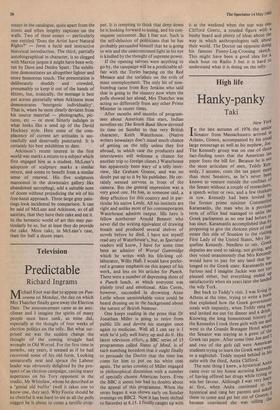Television
Predictable Richard Ingrams Michael Foot was due to appear on Pan- orama on Monday, the day on which Mrs Thatcher finally gave away the Election Date. The announcement came as an anti- climax and I imagine the spirits of many people must have sunk, as mine did, especially at the thought of four weeks of election politics on the telly. But what sur- prised me was the sudden change the thought of the coming struggle had wrought in Old Worzel. For the first time in months, nay years, it seemed as if he had recovered some of his old form. Looking unnaturally neat and spruce the Labour leader was obviously delighted by the pro- spect of an election campaign, casting many aspertions on his Tory opponent in the studio, Mr Whitelaw, whom he described as a 'genial old buffer' (well it takes one to know one, they say). Why Footie should be so cheerful it was hard to see as all the polls suggest he is about to come a terrific crop-
per. It is tempting to think that deep down he is looking forward to losing, and his con- sequent retirement. But I fear not. Such is the self-delusion of politicians that he has probably persuaded himself that he is going to win and the unaccustomed light in his eye is kindled by the thought of supreme power.
If the opening salvoes were anything to go by, the campaign will be a predictable af- fair with the Tories harping on the Red Menace and the socialists on the evils of mass unemployment. The only bit of non- humbug came from Roy Jenkins who said that in going to the country now when the polls showed her ahead, Mrs Thatcher was acting no differently from any other Prime Minister in recent times.
After months and months of program- mes about American film stars, Indian novelists etc The South Bank Show devoted its time on Sunday to that very British character, Keith Waterhouse. (Native writers nowadays don't stand much chance of getting on the telly unless they live abroad, in which case the producers and interviewers will welcome a chance for another trip to foreign climes.) Waterhouse has apparently been wary of a telly inter- view, like Graham Greene, and was no doubt put up to it by his publisher. He cer- tainly seemed nervous in front of the camera. But the general impression was a very good one. He has, as someone said, a deep affection for this country and in par- ticular his native Leeds. All his instincts are right and unlike most of his contemporaries Waterhouse admires output. His hero is fellow northerner Arnold Bennett who never did the writing equivalent of drawing breath and produced several shelves of novels before he died. I have not myself read any of Waterhouse's, but, as Spectator readers will know, I have for some time been an admirer of Worzel Gummidge which he writes with his life-long col- laborator, Willis Hall. I would have prefer- red a greater emphasis on this aspect of his work, and less on his articles for Punch. There were a number of depressing shots of a Punch lunch, at which everyone was plainly tired and emotional. Alan Coren, however, succeeded in drowning Anne Leslie whose unmistakable voice could be heard droning on in the background about the nature of British humour.
One keeps reading in the press that Dr Jonathan Miller is going to retire from public life and devote his energies once again to medicine. Well all I can say is I wish he'd jolly well hurry up and do it. His latest television effort, a BBC series of 15 programmes called States of Mind, is of such numbing boredom that it ought finally to persuade the Doctor that the time has come for him to put on his white coat again. The series consists of Miller engaged in philosophical discussion with a number of specially chosen American bores. Even the BBC it seems has had its doubts about the appeal of this programme. When the series began it was shown early on Sunday evenings on BBC2. Now it has been shifted to Saturday at 6.15. I finally caught up with
it at the weekend when the star was one Clifford Geertz, a tousled figure with a bushy beard and plenty of ideas about the way in which anthropologists talk about their world. The Doctor sat opposite doing his famous Funny-Leg-Crossing sketch. This might have been a good idea for a slack hour on Radio 3 but it is hard to understand what it is doing on the telly.










































 Previous page
Previous page